Items
Tag is exactly
support
-
2020-04-01
Navigating the Pandemic
Covid-19 was life changing not just for me but for the rest of the world. Finding out that school was going to closed for a day, to two weeks, to months and then suddenly spending my senior year of highschool through zoom. At first, like every student I was excited that school was going to be off for a few days but who would have known what we were in store for. During this time, I was taking all classes through zoom, just like every other student, and the only thing that mentally got me through this pandemic was my PGC family. PGC is known as Peer Group Connection in my high school, Thomas A. Edison CTE. This class was operated by the seniors who had this own group with another partner to talk to freshman, sophomore, and juniors. This class was mainly about encouraging and helping one another as well as doing activities. Although, the pandemic had a significant impact on this class, we were only meeting through zoom but overall we were all eachother's support system. We talked about any and everything with our kids, the good and the bad. This helped us tremendously with our emotions, as well as still having fun through such a difficult time period. -
2020-12-20
Declaring Patient 100 Deceased Life as a NYC EMT During an Unprecedented Global Pandemic
December 20th, 2020, started as an “ordinary” day for myself and my colleagues. 1600 hours rolled around, and my partner and I clocked in for our sixteen-hour tour. We had finally adjusted to our new routine of working a mandatory sixteen hours as opposed to twelve. As emergency medical technicians, we were at the forefront of the COVID-19 Pandemic in New York City. Our region was hit hard by COVID-19 and seemed to be the epicenter of the pandemic for longer than one could ever imagine. For NYC EMS workers before the pandemic, it was common to see around three thousand calls for service daily across all five boroughs. Once the pandemic struck the call volume rapidly overwhelmed the city's EMS resources as they answered a record seven thousand calls for service daily. My partner and I made small talk as we awaited the arrival of the outgoing crew. The day shift arrived back at the station exhausted, defeated, and depressed. They informed us that during their sixteen-hour tour, they had answered twenty calls for service; fifteen of which were for critically ill patients. After some small talk, we exchanged medication kits and radios as it was our turn to serve the great city. Immediately after logging on to the computer system and giving the dispatch center an in-service signal, we were called for a priority one assignment. Our unit was called to the scene of a thirty-two-year-old mother diagnosed with COVID-19 who had stopped breathing. As we arrived at the scene, I donned my four-day-old n95 mask, as well as a makeshift gown made from a garbage bag with holes cut for my head and arms. As we made our way up the five flights of stairs the sound of the screams grew louder. We entered the apartment to find a woman lying on the couch who was clinically deceased. For the next forty-five minutes, my partner and I worked feverishly to perform cardiopulmonary resuscitation, defibrillation, endotracheal intubation, as well as intravenous cardiac drug administration. Despite our efforts, the patient continued to show no signs of life, my partner and I locked eyes and nodded at one another, knowing we had done all that we possibly could have for this patient. I switched the cardiac monitor off and looked down at my watch as I said, “Time of death 1705 hours”. Our next responsibility was to inform the patient’s husband and children of her passing. While you train for many hours to show empathy after death, this task never gets easier. My partner sat in the kitchen with the family, while I prepared the paperwork for a death pronouncement. My partner delivered the life-shattering news and did her best to console a grieving family. After returning to our ambulance to decontaminate our equipment and restock for the next assignment I opened my logbook to record the death encounter. My heart sank as I turned to the next open page which was page number one hundred. In less than one year, I had pronounced one hundred patients deceased from COVID-related illnesses. In my short career before the pandemic, I had only pronounced about fifteen patients deceased. It was at that moment that the true magnitude of the pandemic sank in. COVID-19 had decimated the way of New York City life, the previously bustling city remained shuttered as many remained in indoors in hopes of preventing illness. Before the pandemic, I had known the city as a connection of vibrant neighborhoods filled with culture and joy. COVID-19 had robbed our great city of its life and color; for the next two years, the city appeared black and white as a shell of its previous greatness. These thoughts quickly fled my mind as my unit was once again called to another high-priority assignment. We were called to a sixteen-year-old man diagnosed with asthma, who had recently contracted COVID-19 and was struggling to breathe. Our days were filled with assignments like these, often with no rest, and zero opportunities for a meal break. Nearly one year into the COVID-19 pandemic, my colleagues and I were exhausted, and our mental health and morale were at an all-time low. Many of my collogues fell ill, and four of them died because of COVID-19. We had often asked ourselves and one another; “Why Us? Why are we still doing this job? and when will this end?” While these times were challenging, we understood that we had been called to work in EMS because of our passion for caring for those in need. Day in and day out, we found strength and resilience in one another. My colleagues and I had implemented daily peer support groups in which all were welcome to come and speak about their experiences. While COVID-19 seemed to pull the world apart, it pulled EMS staff closer together. Enemies quickly became friends, and seemingly overnight we all became family. Our perspectives were unique as we were the only healthcare providers to enter the homes of the ill, and feverishly worked to care for them under less-than-ideal conditions. As the number of COVID-19 cases began to decline with the introduction of the vaccine, my colleagues and I felt we could breathe a sigh of relief. As quickly as the pandemic entered our great city, it seemed to vanish even faster. Each shift brought hope as we watched businesses reopen, and the streets were once again filled with color and culture. While we experienced new variants and spikes in COVID-19 cases, we felt that our great city had become stronger and more resilient. While COVID has changed our way of life, one thing I will never forget is the comradery we built amongst the emergency medical services personnel. To this day my colleagues remain a second family in which I can confide after a difficult shift. While COVID was one of the greatest challenges faced by New York City, I feel that it has made us stronger and more resilient than ever. -
2021-04-19
Brave
Covid 19 almost took away one of the most significant people in my life, my grandmother. The near loss of my grandmother due to COVID-19 made me realize the devastating impact infectious diseases can have on individuals and their families. It reinforced the importance of proactive measures to prevent disease spread and protect vulnerable populations, regardless of ethnicity or background. This experience made me strong enough and brave enough to provide my grandmother with the support and comfort needed during this scariest moment of my life. During my grandmother's battle with COVID-19, I learned firsthand how crucial it is to provide unwavering support and comfort to loved ones during challenging times. The emotional strength and presence I offered her made a significant difference in her recovery journey, reminding me of the power of love and compassion in the face of adversity. -
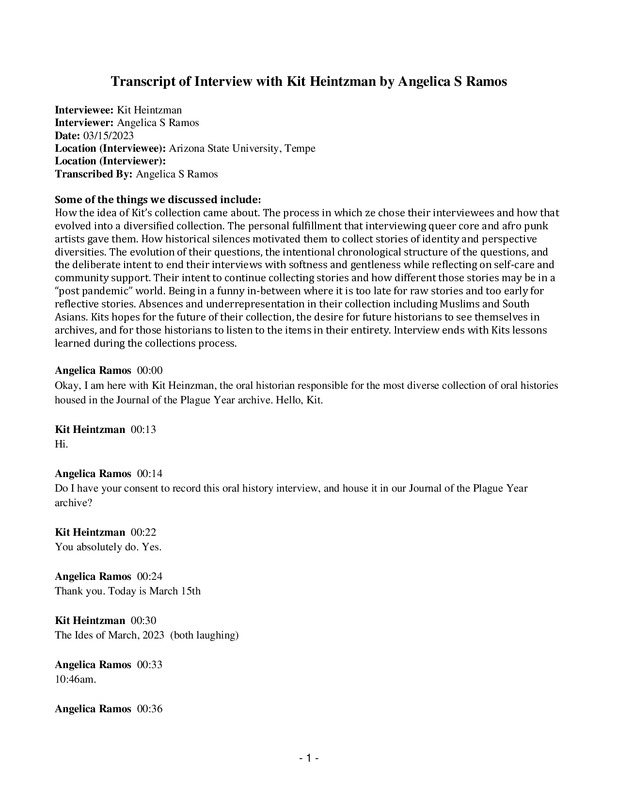 2023-03-15
2023-03-15Kit Heintzman Oral History, 2023/03/15
Kit Heintzman is a recovering academic currently residing in Lenapehoking, who was trained in the medical humanities with a special interest in queer theory, animals, and the history of nationalism. Kit has developed a singular collection of oral histories of the pandemic for A Journal of the Plague Year, collected from a range of individuals with widely diverse experiences. That collection addresses significant silences surrounding the pandemic broadly and within JOTPY more narrowly. In this item Kit is interviewed by Angelica and Erin, both with Arizona State University, about Kits collection process. -
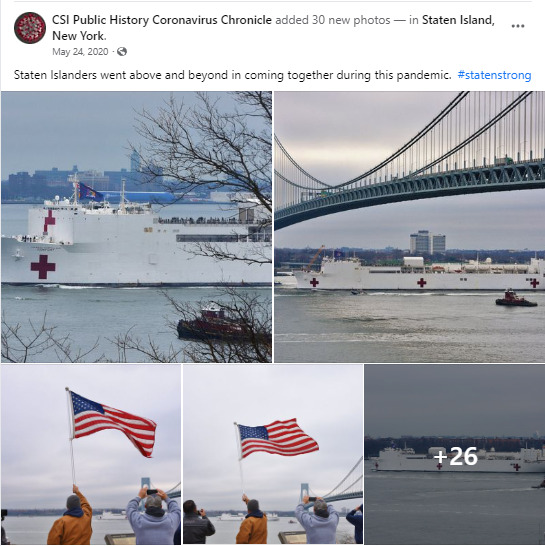 May 24th, 2020
May 24th, 2020Above and Beyond
Staten Islanders went above and beyond in coming together during this pandemic. -
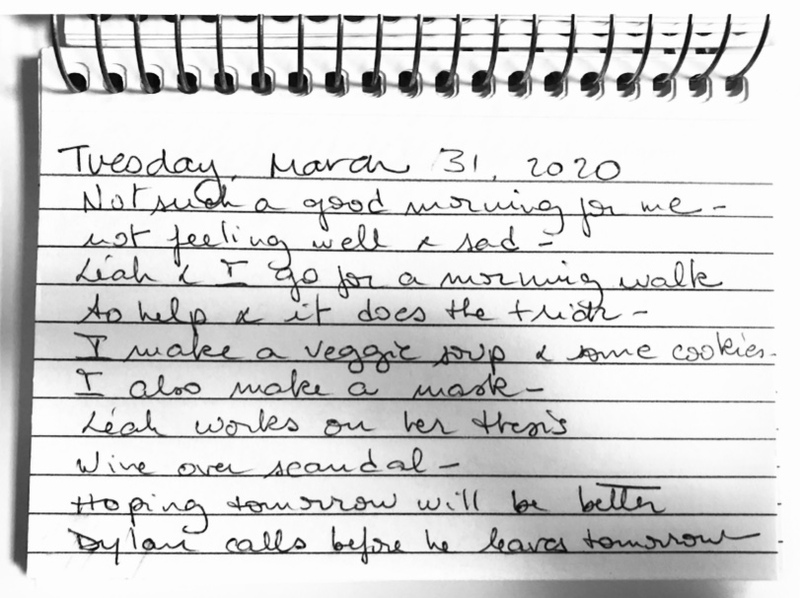 2020
2020Daily Entries
The three index card entries represent our emotions and actions at the start of the pandemic. I came back home from school to live with my mom so we relied on one another for emotional support. The shared journal helped us record our daily activities, take note of our current state of minds, and allowed us to 'take it one day at a time.' The act of writing down our movements (or lack thereof) and accomplishments (ranging from submitting my thesis to making sweet potato fries) helped us recognize that time was passing and that good days were approaching. We continued to write in our shared spiral journal for about 6 months. The entries are important to me because they reflect how my mom and I were feeling at a very uncertain and unique time in history. While I don't feel comfortable reading through them all just yet, I'm excited for the day when enough time has passed and I can reflect on the months in isolation in an objective manner. -
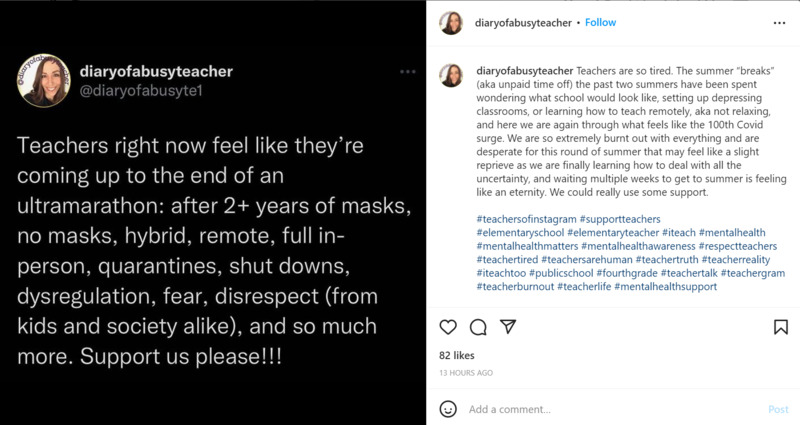 2022
2022Teachers are Tired
Now that we are ending the 2022 school year, many people have "returned to normal". Most students no longer wear masks in schools. However, we are still working through the pandemic. Teachers are still at risk for contracting COVID and are navigating the severe behavioral problems of students. With summer approaching, everyone is looking forward to a break from an extremely stressful year. -
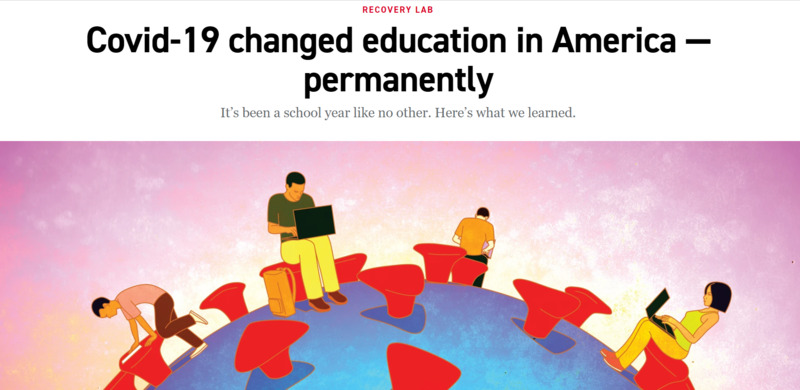 2021-04-15
2021-04-15COVID-19 Changed Education in America
The pandemic has completely changed education. Students' views and attitudes towards school has changed, as well as been impacted by trauma and lack of normal school routine. School districts and teachers have been scrambling to accommodate to the new change while also trying to maintain a feeling of being "normal" during a pandemic. -
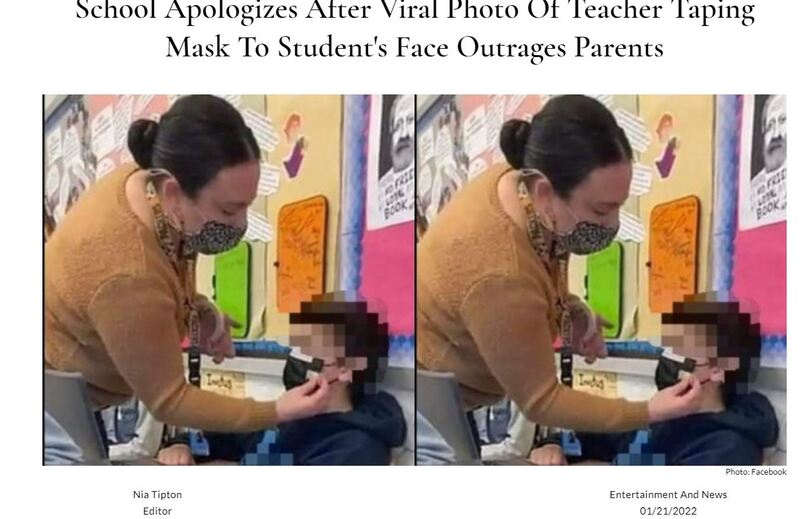 2022-01-21
2022-01-21School Apologizes After Viral Photo Of Teacher Taping Mask To Student's Face Outrages Parents
This is a news story from Your Tango by Nia Tipton. This is about a middle school in Pennsylvania, where a video of a teacher taping a mask to a student caused outrage. The photo was taken at Pennfield Middle School in Hatfield. The photo went viral and appeared on Sean Hannity's website. The middle school announced that they are going to conduct an investigation over this scandal. Parents also expressed their anger at school board meetings over this. The mother of the student getting his mask taped to his face says that she never intended for the story to go viral. She used the photo to gain support from a Facebook group prior to a school board meeting. She says that other individuals in the group took it upon themselves to spread this story further. -
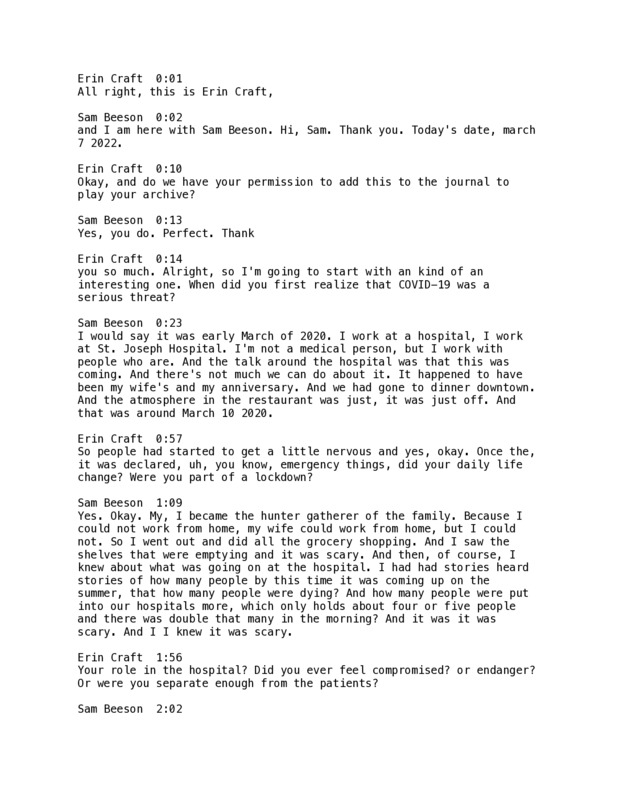 2022-03-07
2022-03-07Sam Beeson Oral History, 2022/03/07
I spoke to Sam at the Arizona Historical Society's 2nd annual Covid Remembrance Event. Sam was with his son, Alex. Alex did not wish to be interviewed but he gave permission to have his health information included in the interview. He was present during the interview. Sam describes his family life during the initial lockdown, how he kept working at the hospital but his wife and son stayed home. Sam called himself the "hunter gatherer" during that time as he was the one getting groceries and running errands. He describes how he got the first dose of his vaccine but also got infected with COVID at the same time. His symptoms were mild, but his son and wife had different experience. Sam describes losing his wife to Covid. He also describes how he has dealt with his grief and anger by joining a support group and Marked By Covid group. He shares his story as a way to honor his wife. -
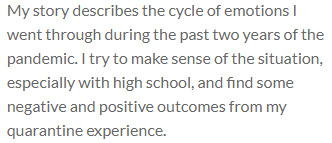 2022-02-07T10:00:00
2022-02-07T10:00:00Taking Covid-19 Step by Step
My story describes the cycle of emotions I went through during the past two years of the pandemic. I try to make sense of the situation, especially with high school, and find some negative and positive outcomes from my quarantine experience. -
2020-04-29
Giving Birth During The Pandemic
My name is Niki, I'm 38 and live in Clovis CA. In March of 2020, I was about 8 and a half months pregnant with my son, Tate. I went to school part time, majoring in Early Childhood Development. I was also a stay at home Mom to my then 3 year old daughter, Quinn. She’s my driving force in school because she is on the autism spectrum. In March she was just beginning to talk and have real words,and her brother was coming, it was an exciting time. My husband Mike, is what they call an over the road trucker. Meaning he was gone all week and home for 30 hours over the weekend. The situation was not ideal for us, but it worked to give me the freedom to be with Quinn to take her to the therapies she needed. Then Covid came to the US. Everyone was forced inside. School shut down. The daycare closed. All therapies were put on hold. Everyone was told to wear a mask and sanitize everything. My baby shower was canceled too many people, myself included, were too scared to get together. Mike was not allowed to come home, in fear of being exposed or exposing us. He had to stay on the truck and keep delivering supplies. Then the hospital called and said I needed to prepare that the beds might fill up in the maternity wards with Covid cases and I might need to do a home birth. Could I find someone to assist me ? I had no one! We had only lived here for a year and I haven't made many friends. I had my Mom but she’s older, not able to deliver a baby and quarantined for her health. My sister lived kinda close but she was with her family and was quarantined like everyone else.I had my three-year-old who only had 4 real words !! Then the hospitals call and say “ Don’t worry you can give birth here, no one can be with you and we might take your baby from you right away and keep them from you for about two weeks to make sure they dont have Covid '' Um No ! Home birth sounds good right about now. I had the worst dreams up until my son’s birth. Thankfully, there were beds open in the maternity ward. Thankfully my husband's dispatch got him home just in time for Tate’s arrival. The hospitals allowed one support person in the room for the birth, so he was there. It was the scariest experience. I begged everyone to not take my baby. The hospital didn’t look like a hospital. Everything was covered in white plastic from ceiling to floors. Everyone had on masks and face coverings. It was a scene from a scifi movie.It was one of the scariest times of my life. Amidst all the chaos and stress my beautiful chunky completely healthy son made his entrance into this world on April 29th, 2020. We stayed in the hospital for two days and no one took him from me. I made sure of that. We went home and adjusted to life with a newborn and living with Covid like everyone else. Its been a year and a half and the hospitals have not changed the rules about only allowing one support person in the delivery room. I try to share as much information to expecting mothers as I can. There are no in and out privileges anymore.Once you are in the hospital, you have to stay there. You need to pack snacks! Or you can have food delivered to the hospital. Still can't have visitors. Have an extensive “go bag” ready for when it’s time to go. I hope with all the advances with the vaccine and lowering cases and people being more conscious of their health the hospitals will relax a little on the support team numbers for expecting moms soon. That’s my Covid19 share. -
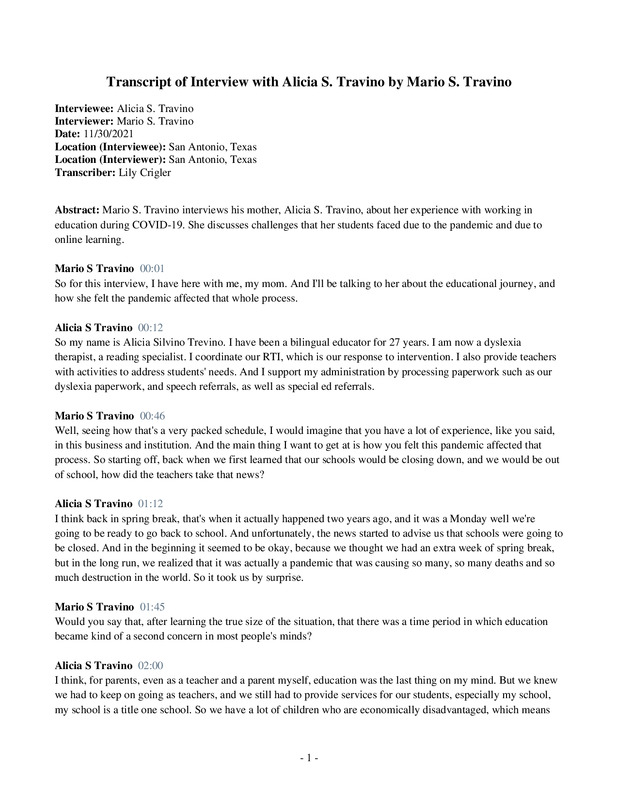 2021-11-30
2021-11-30Alicia S Trevino Oral History, 2021/11/30
The sometimes overlooked part of this pandemic has been the experience of the educators and their side of the story. Here I sat with my mom to gather her experience and thoughts on what's been a rough year. We talked about the changes she witnessed and how it affected not just the kids but herself and the teachers around her as well. -
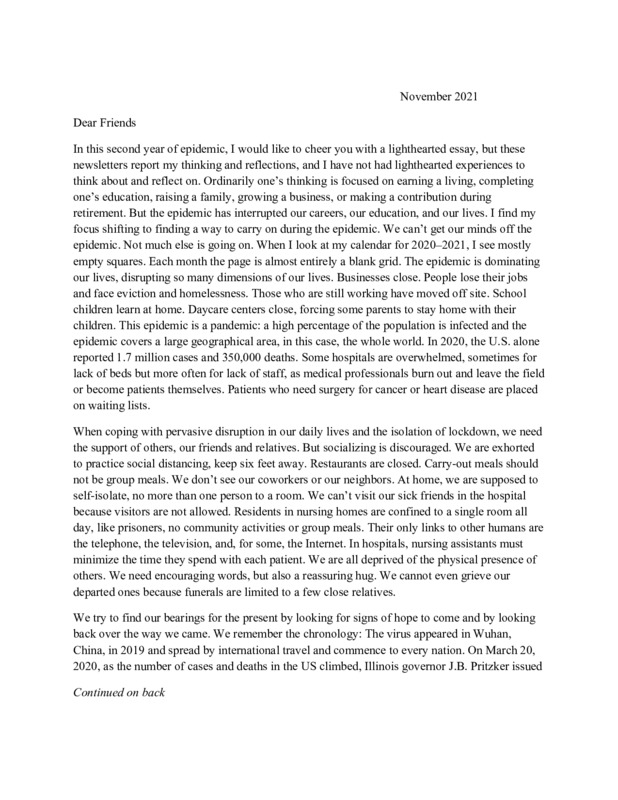 2021-11-03
2021-11-03My Annual Newsletter to Friends 2020 and 2021
At the holidays I send a newsletter about whatever I have been thinking that year. This year and last the newsletters were about the epidemic. I was looking for examples in history to help us see today how we could cope with the disruption of our lives. -
 2021-07-08
2021-07-08Has COVID-19 Created Conflict in Your Relationship?
A blog post from Banner Health about relationships with partners and spouses during Covid-19. -
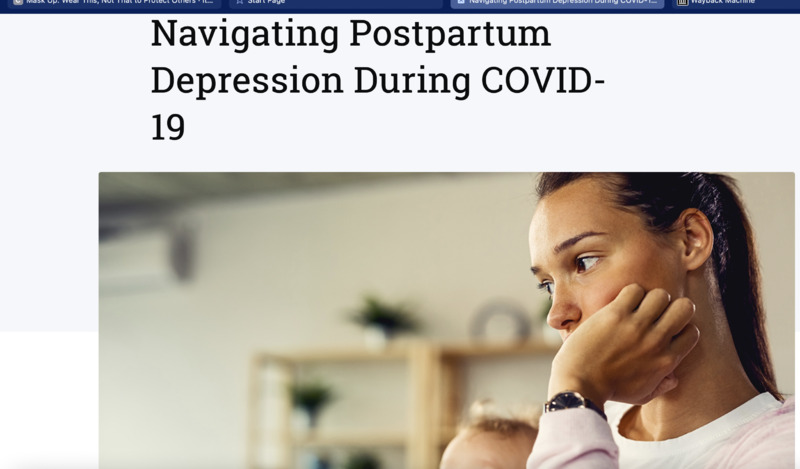 2020-07-09
2020-07-09Navigating Postpartum Depression During COVID-19
A blog post from Banner Health about post-partum depression during Covid-19. -
 2020-04-16
2020-04-16Covid Consolation Puppy
A week after the first shutdown began in March of 2020, schools were shut down and I was no longer able to complete my student teaching. I was furloughed from my job and locked inside for what we originally thought would be two weeks. With no end to the lockdown in sight and nothing to do, it became stressful and quite boring. Living with my parents at the time, the entire family was locked inside and tensions were high. One day, my mom got a call from a former coworker whose dog had just had puppies a month prior. She offered us a puppy and my mom, knowing how sad I was at not having a job or an internship, accepted and I was able to pick any puppy I wanted. Freyja, my dog, was my Covid-consolation-puppy. She was very young and I was up all night and all day with her, potty training and playing with her. My time was entirely consumed by this puppy and I was never bored or alone again. We joke that she was a consolation puppy because I never got to complete the typical training any teacher before received. A few months after the first shut down ASU canceled graduation and went virtual, it was another blow, and knowing I would not be able to walk the stage to get my degree was tough to handle. However, Freyja made things easier and took my mind off things. She grew with me and she became my best friend and protector. When I moved out, she kept me safe. When I separated from a long-term partner, she was what I found joy in. I love my dog very much because she came into my life when I needed her most. -
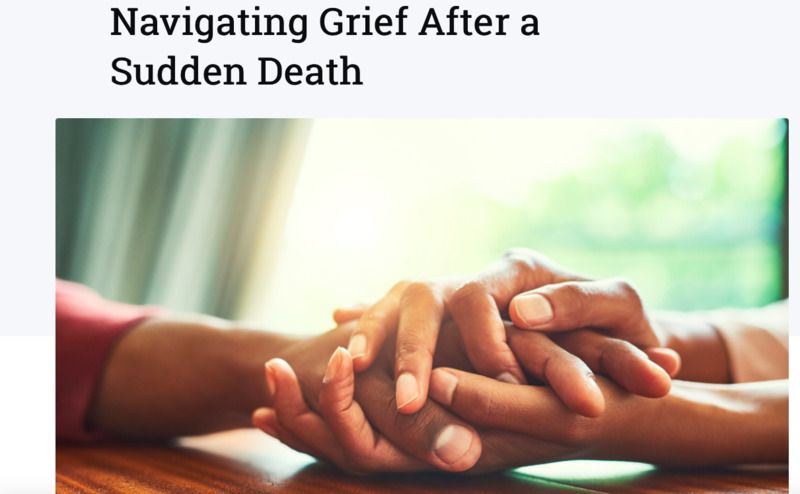 2020-04-07
2020-04-07Navigating Grief After a Sudden Death
A blog post from Banner Health offering suggestions on managing grief. -
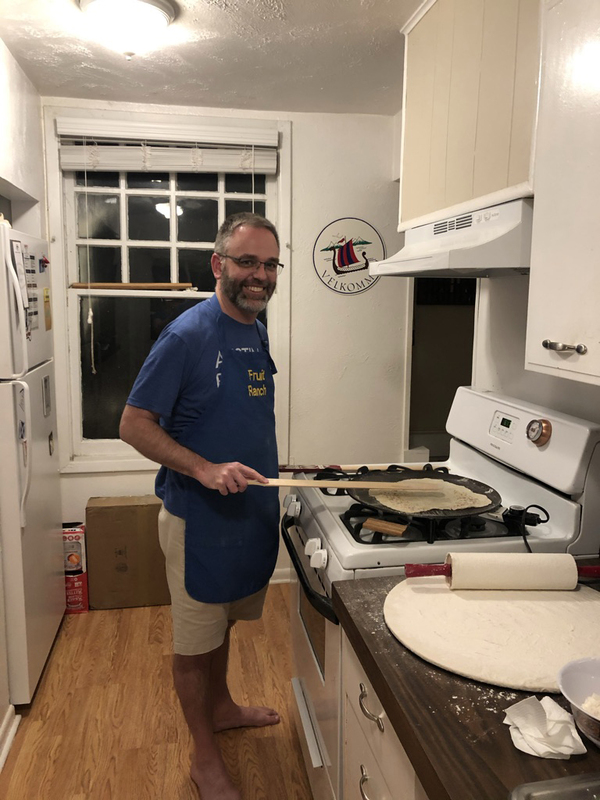 2020-11-30
2020-11-30Creating New Traditions in a Pandemic
One of the traditions in my family is to make lefse, a type of Norwegian flatbread, at Christmas time. This tradition was started by my grandmother, because it was one of the foods that she associated with her childhood Christmases as the child of Norwegian and Swedish immigrants. Every year, no matter what was going on, we gathered together as a family at the start of the Christmas season to make lefse. If you’ve made lefse before, you can attest to it being a labor-intensive process, which involves ricing pounds of potatoes, rolling out dozens of balls of dough until they are paper thin, and frying them one by one on a hot griddle. It’s one of those recipes that works better if you have several people to help. In my family, everyone had a job to do. The youngest children of the family were put in charge of popping air bubbles that rose from the dough while it cooked. The older kids took turns flouring the rolling boards and rolling out the dough. The adults were responsible for cooking the lefse, a process that involved transferring huge rounds of dough to the hot griddle using long turning sticks. Even family members who were not culinarily inclined were put to work, folding the finished lefse and packaging it up so that it could be frozen, so that it was available for Christmas morning. It was a family affair, that filled the kitchen up with laughter and stories and more than one flour fight. Family lefse day is one of the most enduring memories of my childhood. When the pandemic made it unsafe to travel or even to visit my family, I found myself facing a Christmas without being able to participate in my family’s lefse making tradition. There were many teary video calls to family members as we all came to terms with the fact that we would be missing this tradition for the first time in nearly 40 years. At this point, after enduring months of isolation because of COVID-19, I was devastated. It didn’t feel like the holidays without this tradition and making lefse by myself felt overwhelming. I was telling my friend Mike about how sad I was over missing out on this tradition, when he offered a solution. We would both quarantine for 14 days, purchase all the ingredients we needed and have them delivered, and then he and I would make as much lefse as we could. I was stunned by his generosity. After all, this was not his tradition. In fact, he’d never even eaten lefse before. But he saw a way that he could help a friend feel better after such a trying year. So, we did just that. With only two of us, it took us about six hours, but we ended up with nearly thirteen pounds of lefse that eventually got sent to family members in four different states. The best moment came when we all video chatted from our homes on Christmas morning, just to eat the lefse together. It was different than normal, but it was a joyous moment. Mike joined us on the call and shared some of the challenges we had making thirteen pounds of lefse in a tiny apartment in the middle of a pandemic. This year, he’s been invited to my parents’ house to join in on the family lefse making day. After all, it’s tradition. -
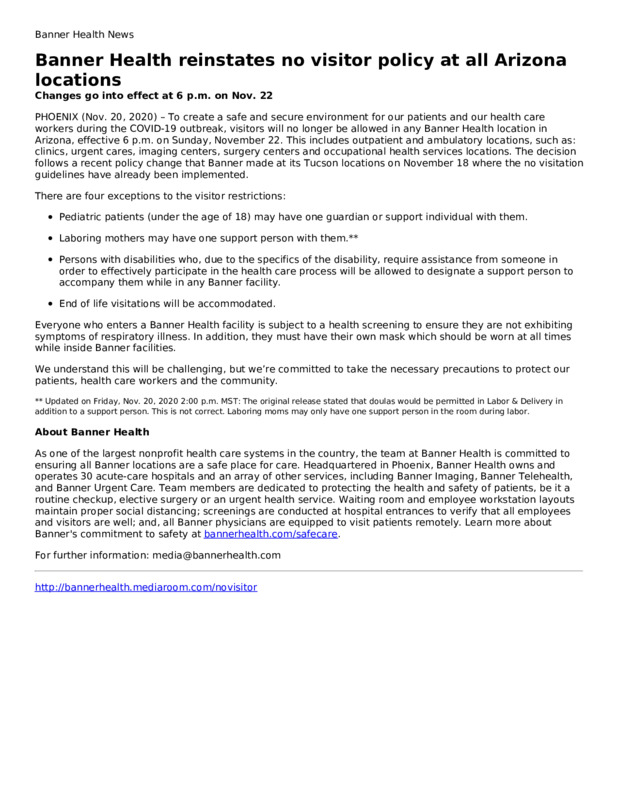 2020-11-20
2020-11-20Banner Health reinstates no visitor policy at all Arizona locations.
A press release detailing Banner Health reinstating no visitor policy at all Arizona locations, going into effect at 6 p.m. on Nov. 22 -
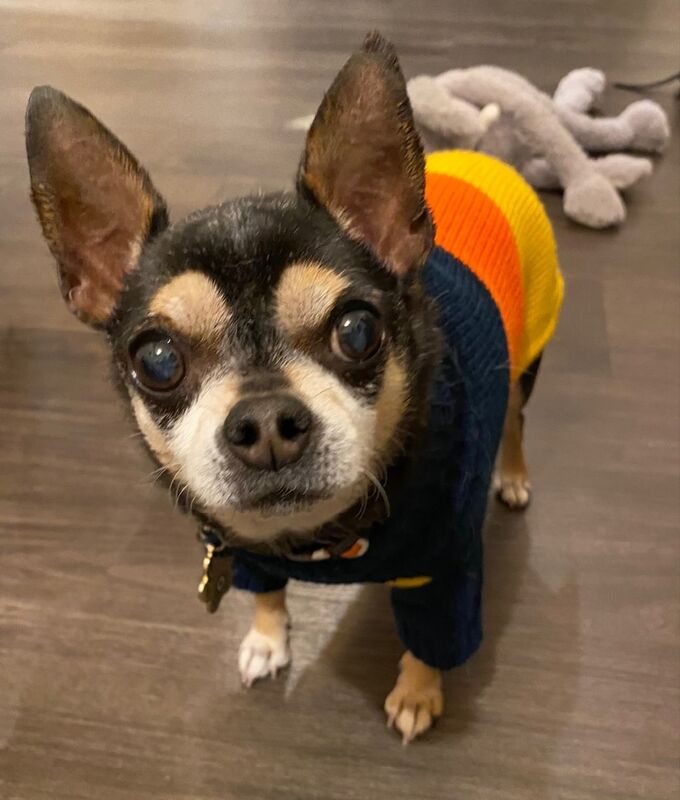 2021-01-26
2021-01-26Running Out of Adoptable Pets
During the pandemic, shelters are having the best problem possible- there aren't enough homeless animals to meet the demand. It is a dream come true scenario for animal lovers everywhere. With more people working from home than ever before, families have more time to devote to a pet. Hopefully the trend will continue, and owners will not surrender their animals after life returns to normal. -
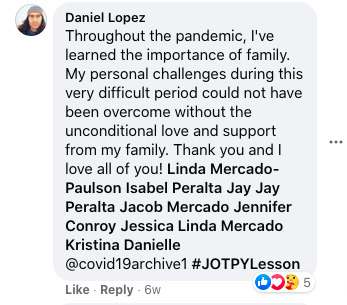 2021-02-27
2021-02-27#JOTPYLesson from Daniel Lopez
Throughout the pandemic, I've learned the importance of family. My personal challenges during this very difficult period could not have been overcome without the unconditional love and support from my family. Thank you and I love all of you! Linda Mercado-Paulson Isabel Peralta Jay Jay Peralta Jacob Mercado Jennifer Conroy Jessica Linda Mercado Kristina Danielle @covid19archive1 #JOTPYLesson -
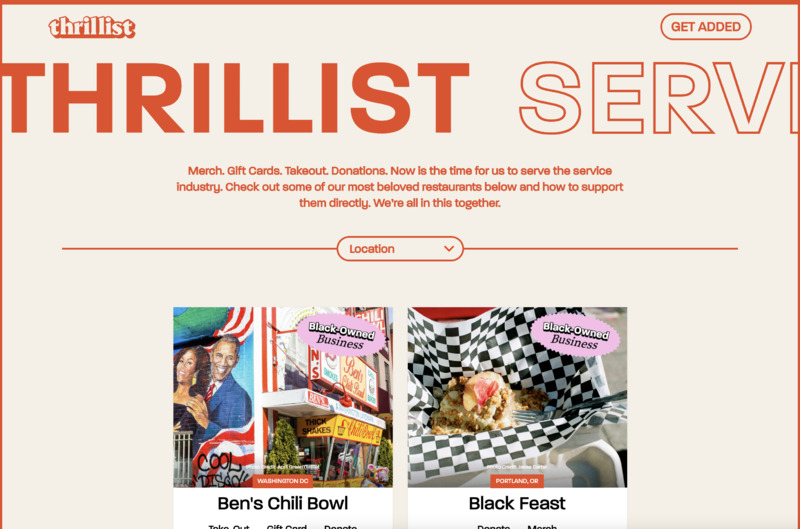 2020
2020Thrillest Serves
Because of the struggle the pandemic has put on small businesses and restaurants, Thrillest has created a webpage that lists a variety of businesses with links to merchandise, donation pages, and places to buy gift cards. By providing this support, Thrillest is trying to prevent any small businesses from closing due to the pandemic, and are spreading the word about small businesses that need support to encourage people to support them rather than large companies that aren't necessarily struggling during this time. They hope to serve the service industry, providing direct support for businesses in many major cities across the U.S. -
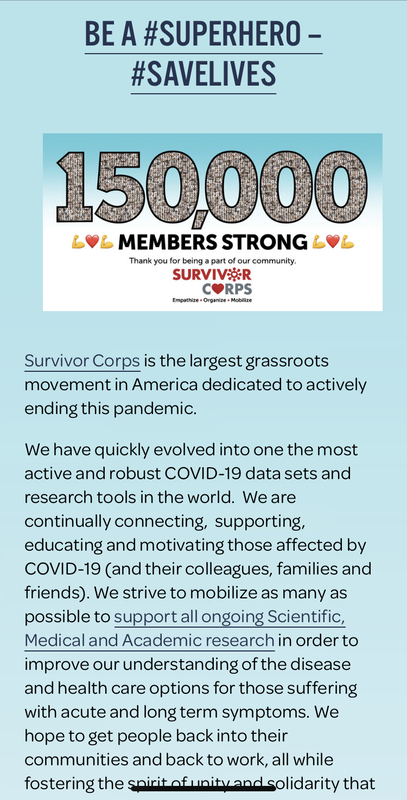 2020-03
2020-03Survivor Corps
One of the more positive outcomes of COVID-19 has been the mobilization of people to support one another and help mitigate the spread of the virus. Survivor Corps, started by an early COVID-19 patient, is “a grassroots solution-based movement to mobilize the sharply increasing number of people affected by COVID-19 to come together, support and participate in the medical and scientific research community efforts and take a more active role in trying to mitigate this pandemic.” Organizations such as this demonstrate the best in people and our potential and desire to work toward the common goal of beating this virus. -
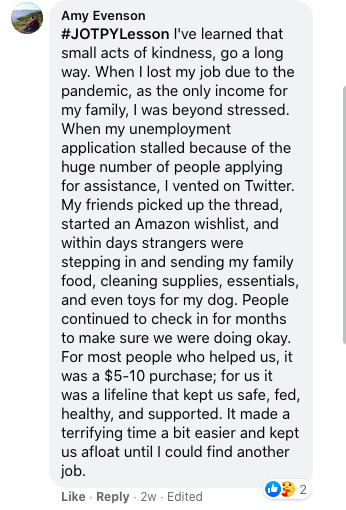 2021-03-23
2021-03-23#JOTPYLesson from Amy Evenson
I've learned that small acts of kindness, go a long way. When I lost my job due to the pandemic, as the only income for my family, I was beyond stressed. When my unemployment application stalled because of the huge number of people applying for assistance, I vented on Twitter. My friends picked up the thread, started an Amazon wishlist, and within days strangers were stepping in and sending my family food, cleaning supplies, essentials, and even toys for my dog. People continued to check in for months to make sure we were doing okay. For most people who helped us, it was a $5-10 purchase; for us it was a lifeline that kept us safe, fed, healthy, and supported. It made a terrifying time a bit easier and kept us afloat until I could find another job. -
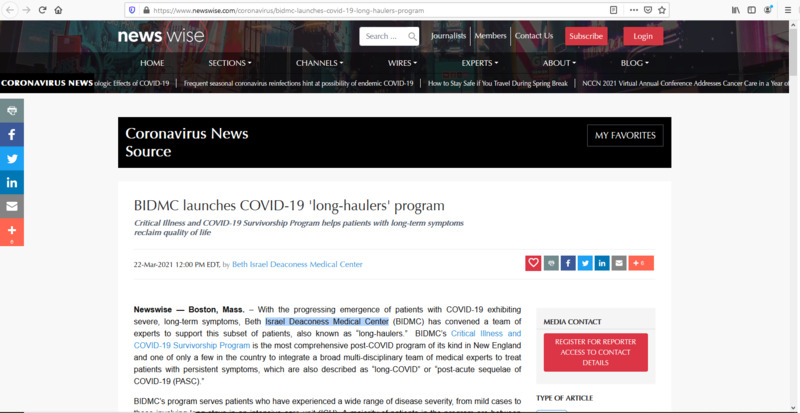 2021-03-22
2021-03-22BIDMC and Long-term Covid Patients
This article is about the new team at Beth Israel Deaconess Medical Center in Boston whose purpose will be to study and support Covid-19 patients with long-term symptoms. These "long-haulers" have an array of physical and mental problems after their recovery from Covid-19. Unfortunately, since research on this virus and it's effects are quite new, experts are still finding out more everyday. This team at BIDMC is one of a few multi-disciplinary teams in the country that is specifically established to provide comprehensive care to these "long-haulers." With so many people contracting Covid-19, teams like this will be critical in how we move forward. As a matter of public health, we need to better understand if there are physiological changes to things like our lung and airway structures, brains, and other organs from having Covid, and if they are permanently damaged or not. This team will not only help these patients, but also help discover important answers for the public as a whole. -
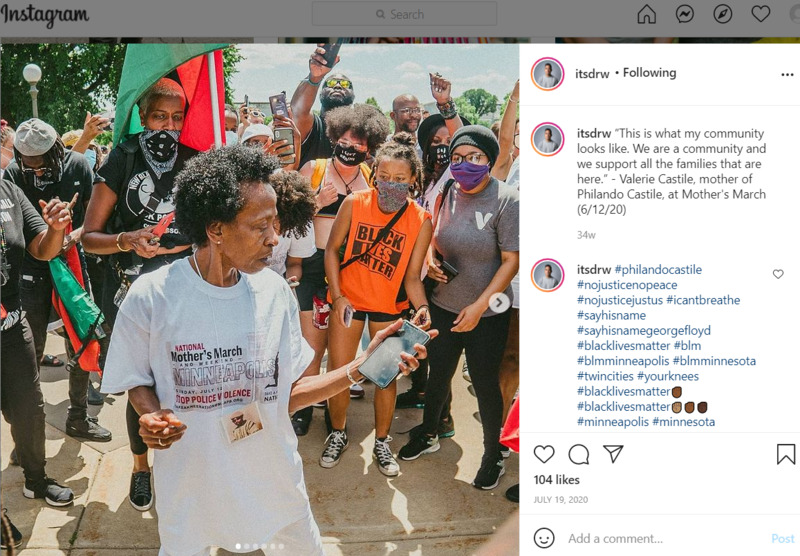 2020-07-19
2020-07-19This is What My Community Looks Like
“This is what my community looks like. We are a community and we support all the families that are here.” - Valerie Castile, mother of Philando Castile, at Mother's March (6/12/20) -
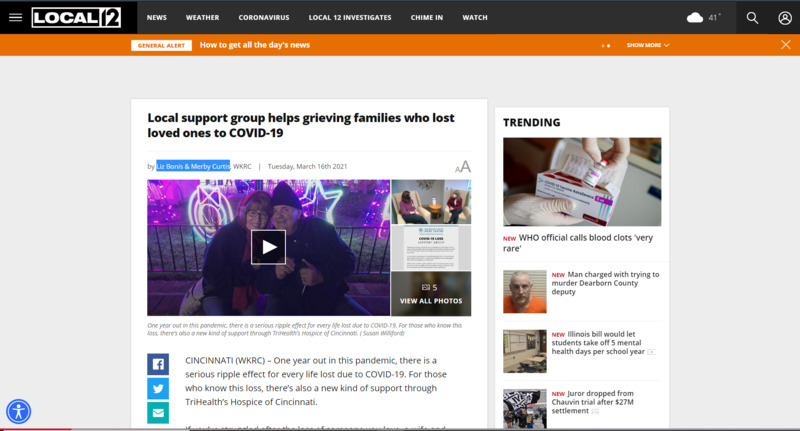 2021-03-16
2021-03-16Local support group helps grieving families who lost loved ones to COVID-19
With COVID-19 restrictions, handling grief is difficult. The normal ways of showing support for a family, or person, that has suffered a death are not currently possible. People are isolated and are unable to receive the emotional support they need to handle the loss. Those who have lost loved ones to COVID-19 seem particularly hard hit by the grief and isolation. In response, a grief center in Cincinnati has started a special online support group for people who have lost loved ones to COVID-19. -
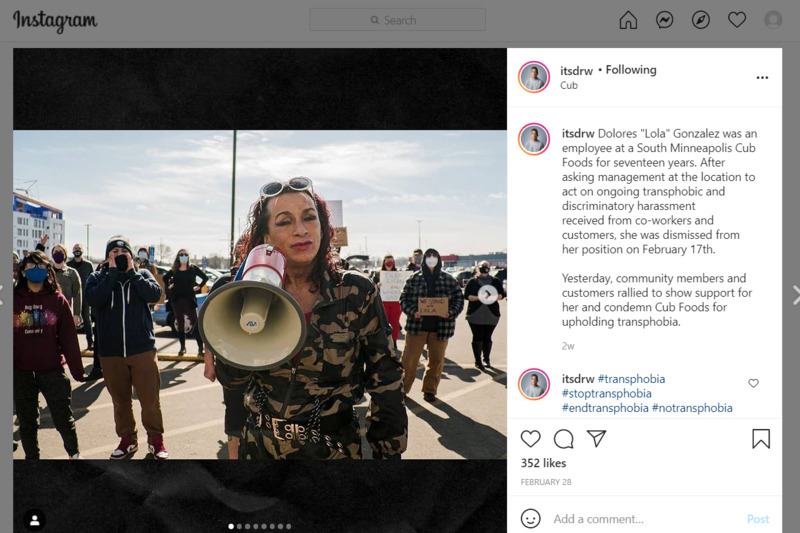 2021-02-28
2021-02-28Transphobia
From Drew Arrieta: Dolores "Lola" Gonzalez was an employee at a South Minneapolis Cub Foods for seventeen years. After asking management at the location to act on ongoing transphobic and discriminatory harassment received from co-workers and customers, she was dismissed from her position on February 17th. Yesterday, community members and customers rallied to show support for her and condemn Cub Foods for upholding transphobia. -
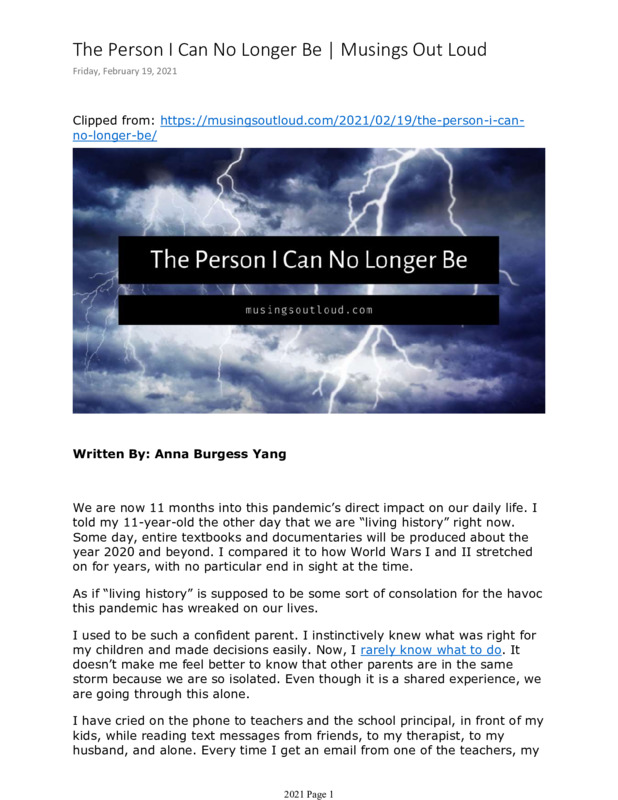 2021-02-19
2021-02-19The Person I Can No Longer Be
This pandemic has been a disaster for parents. We have two adults working from home, two remote learners, and a 3-year-old. Cut off from our usual support systems, many days we feel like we are hanging on by a thread. I write a lot and have been chronicling our day-to-day activities (or lack thereof) throughout the pandemic. -
 2020-11-30
2020-11-30L’hiver sera difficile
This hopeful message from Canada's Finance Minister, Chrystia Freeland, says that Canadians have a plan to get through the winter, and then will move on to economic recovery. -
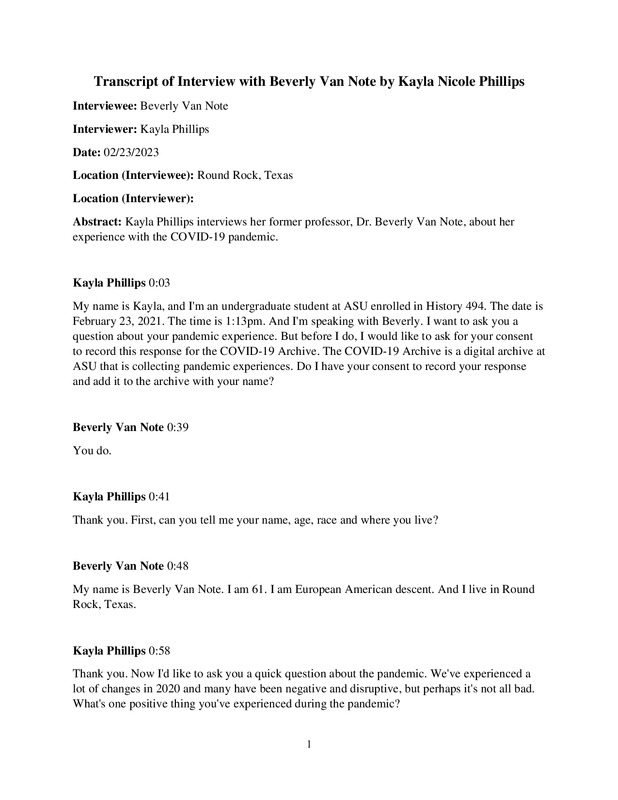 02/23/2021
02/23/2021Beverly Van Note Oral History, 2021/02/23
I recorded a mini oral history with my former professor Dr. Beverly Van Note. -
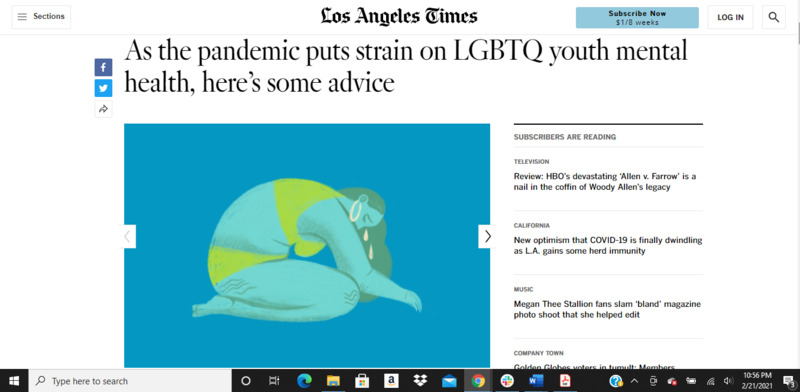 2021-01-07
2021-01-07As the pandemic puts strain on LGBTQ youth mental health, here's some advice
A news article discussing the mental struggles of the LGBTQ+ youth, and how quarantine is negatively affecting their health, as well as some helpful tips. -
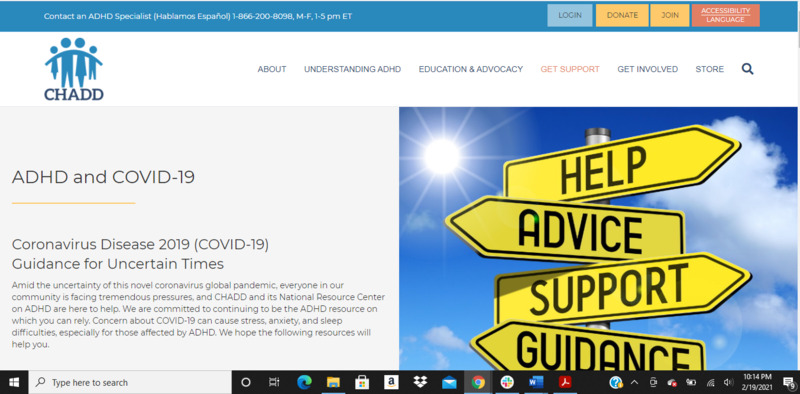 2021-02-07
2021-02-07Supporting Children with ADHD During A Pandemic
ADHD is thankfully not as new of a topic to talk about, but I cannot deny that the stigma against mental health still exists today. While thinking about how so many children are now spending a year and an uncertain future indoors, learning from home, and some unable to grasp why, I thought about those with ADHD. A person’s home is supposed to be associated with comfort and otherwise relaxation from a day at out in the world – at school and work for guardians. Associations can be very powerful, and it can be rather disruptive for children with this big of a change. Half a child’s day is typically dedicated to academics and social connections and is especially important for children in their formative years. Due to the pandemic, they have been pulled from that environment they have already associated with learning, friends, and routine. The links provide some assistance for guardians who may be struggling with their child(ren), especially those diagnosed with ADHD. Concentration and routine seem to be the biggest obstacles, so I do hope the strategies provided may be of help to guardians and their dependents. https://childmind.org/article/giving-kids-with-adhd-support-and-structure-during-the-coronavirus-crisis/ https://www.healthychildren.org/English/health-issues/conditions/COVID-19/Pages/ADHD-and-Learning-During-COVID-19.aspx https://chadd.org/adhd-and-covid-19/ -
2021-01-17
Twitch Streaming
At the end of last year, after some motivation from my friends, I began to stream on the gaming stream platform Twitch. It had always been a wish of mine to do something along those lines, but my timidness limited my capabilities. Considering how much of my time in quarantine was spent gaming, my friends encouraged me to start streaming, while I still had the opportunity. I can't wait to continue in the new year, especially with the support of my friends, so that I can have a small following in the future! -
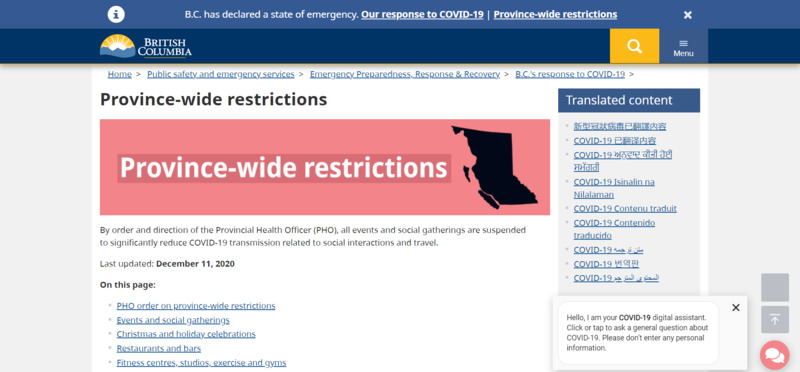 2020-12-11
2020-12-11Province-wide restrictions
By order and direction of the Provincial Health Officer (PHO), all events and social gatherings are suspended to significantly reduce COVID-19 transmission related to social interactions and travel. -
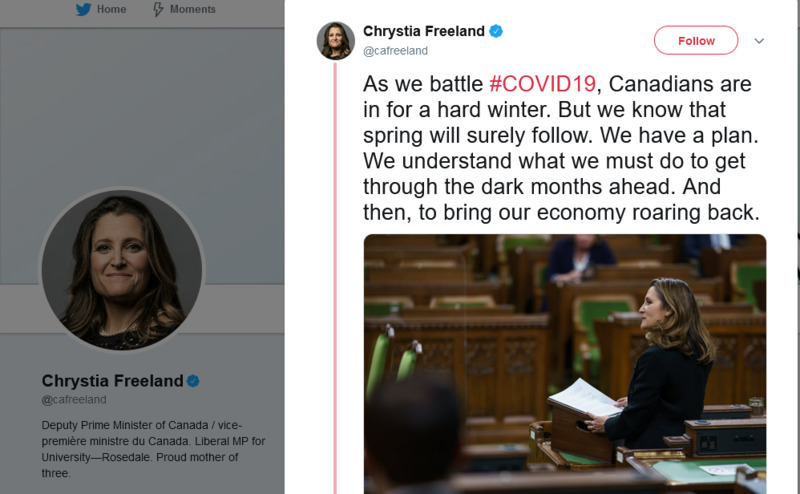 2020-11-30
2020-11-30Winter, then Recovery
This hopeful message from Canada's Finance Minister, Chrystia Freeland, says that Canadians have a plan to get through the winter, and then will move on to economic recovery. -
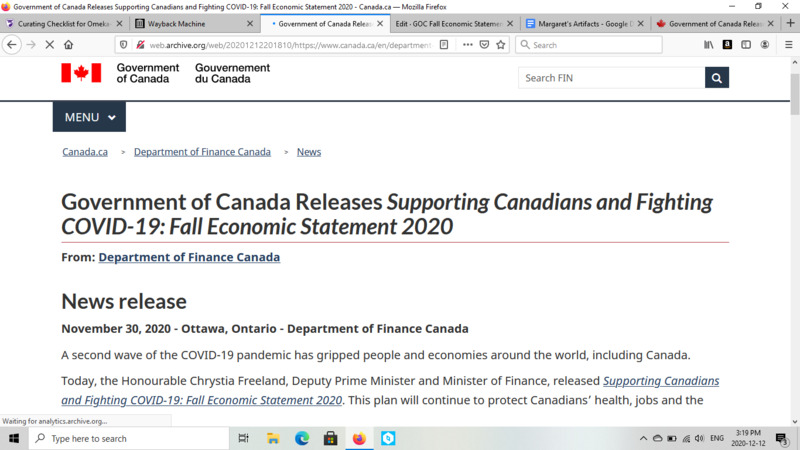 2020-11-30
2020-11-30GOC Fall Economic Statement
The Government of Canada's Fall Economic Statement. -
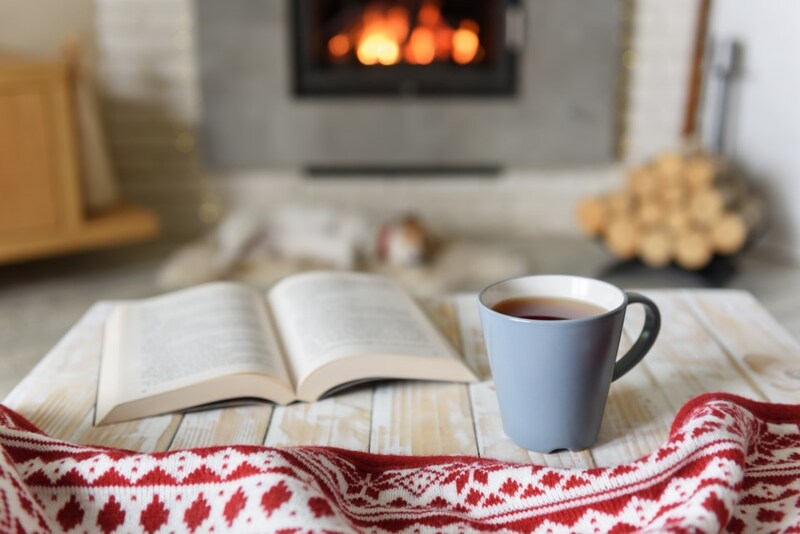 2020-04-02
2020-04-02COVID-19 isolation spurs Canadians to read, exercise, call loved ones
This article provides a report on how Canadians across the provinces spent their time at the start of the pandemic. The report includes how often citizens dined out, ordered food, and what types of entertainment they engaged in under lockdown. -
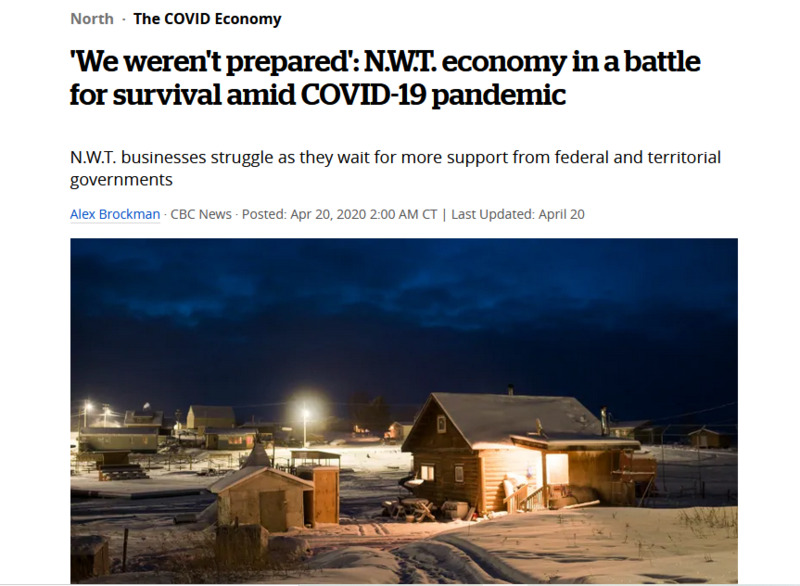 2020-04-20
2020-04-20NWT Economy
Article describing the economic battle faced by the Northwest Territories. -
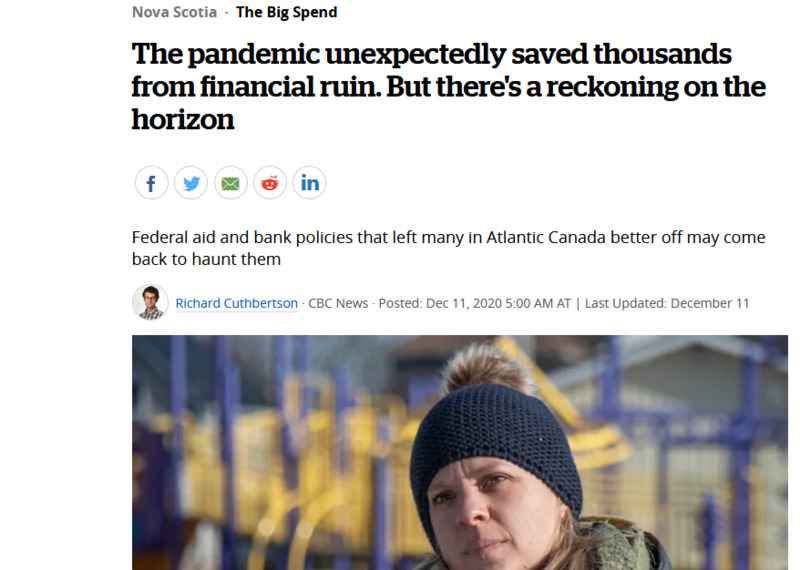 2020-12-11
2020-12-11Post-pandemic Reckoning
This article talks about the financial worries Canadians are facing as the pandemic and government supports lift. -
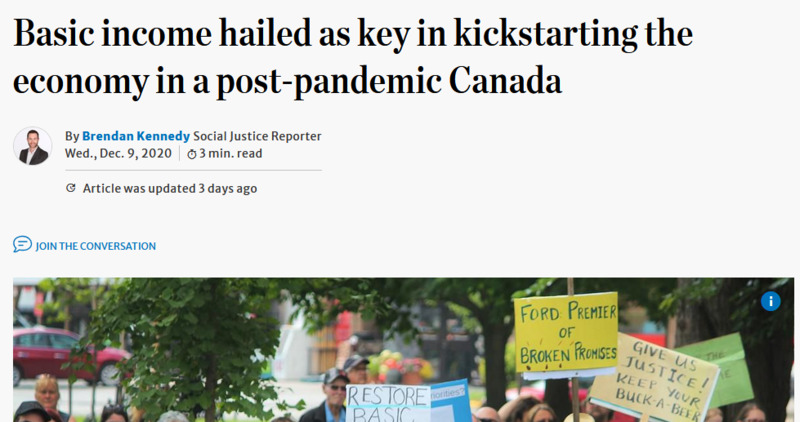 2020-12-09
2020-12-09Basic Income as Economy Kickstart
This article discusses new interest in introducing a universal basic income to Canada, and how it could help the economy. -
 2020-12-12
2020-12-12Newfoundland Small Business Assistance
This release from the government of Newfoundland and Labrador is an example of the kind of business support programs governments introduced in the pandemic. -
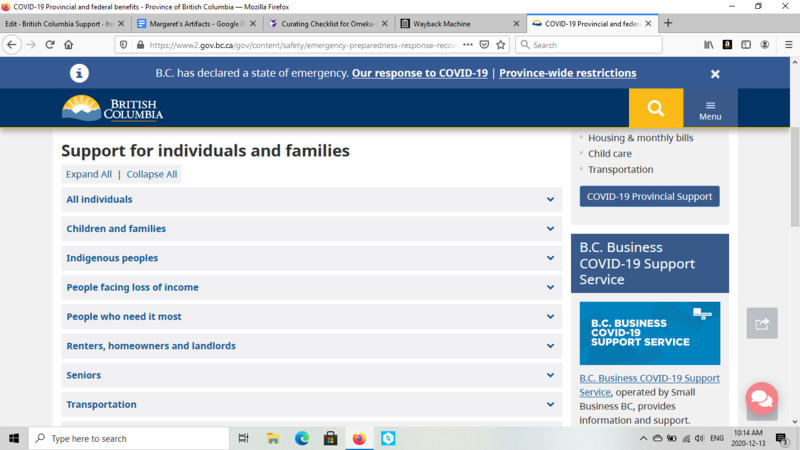 2020-12-11
2020-12-11British Columbia Support
This release is an example of the kinds of minor financial supports provinces offered during the pandemic. -
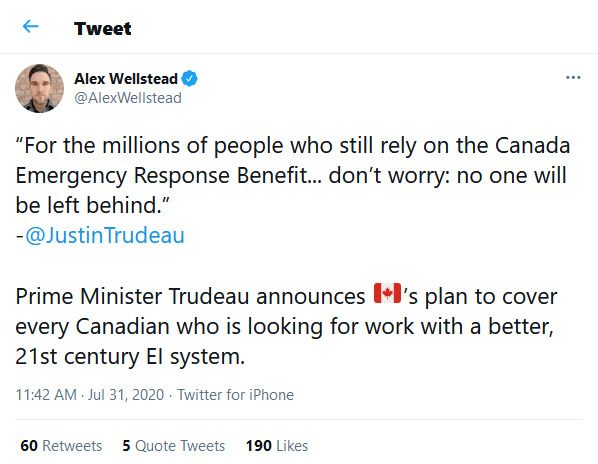 2020-07-31
2020-07-31No one left behind
A tweet quoting what became a catchphrase for government response to the pandemic: No Canadian Left Behind. -
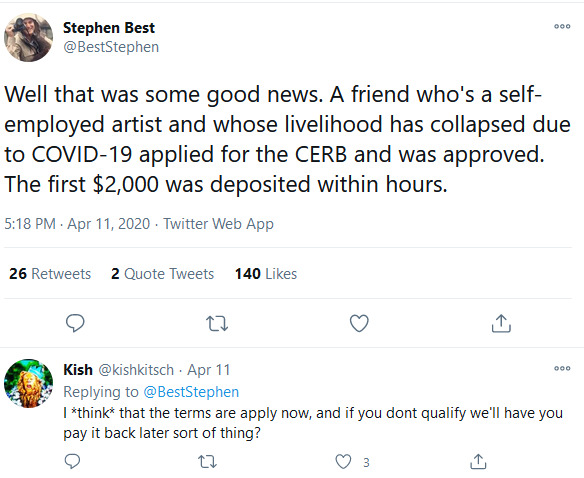 2020-04-11
2020-04-11CERB Approval
This tweet summarizes the relief many people felt when receiving Canada Emergency Response Benefit (CERB). The replying tweets also sum up discussions and questions about CERB in April 2020. -
 2020-05-01
2020-05-01Facing fears workers won't work, Prince Edward Island asks Ottawa to change COVID benefits programs
This article talks about a fear that many people had early in the pandemic- that people receiving government aid wouldn't go back to work. -
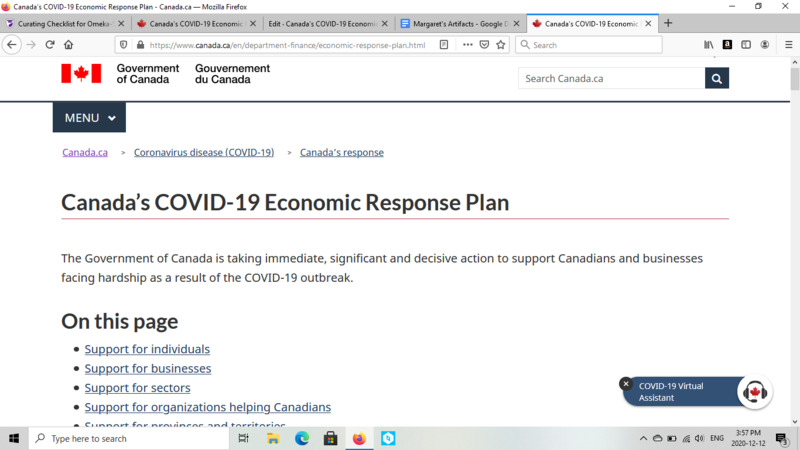 2020-12-10
2020-12-10Canada’s COVID-19 Economic Response Plan
Government of Canada site that gives the details of all the support programs they are offering. -
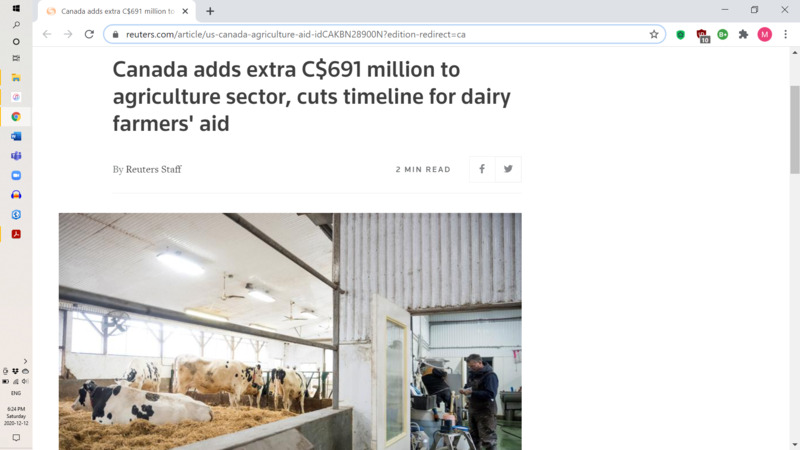 2020-11-28
2020-11-28Canada adds extra C$691 million to agriculture sector, cuts timeline for dairy farmers' aid
Article about funding for the agriculture industry -
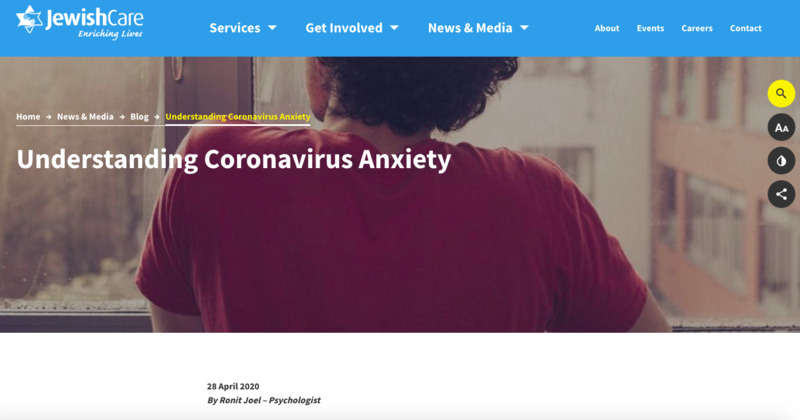 2020-04-28
2020-04-28Jewish Melbourne: Jewish Care blog post - Understanding covid anxiety
Blog post by Ronit Joel – Psychologist, for Jewish Care, about understanding and managing covid anxiety
